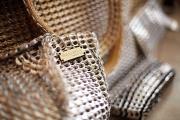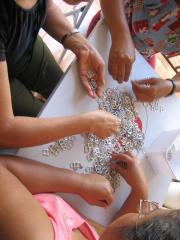
(Photo: Cans transform into high fashion at Walleska Ecochicc)
By Jada Brazell
Walleska Ecochicc strives to improve quality of life for people and planet, one aluminum can at a time.
Founded five years ago by Walleska Tepping, Walleska Ecochicc’s apparel and accessories are handcrafted with recycled can tabs by highly skilled Brazilian artisans.
“The products take a lot of engineering,” Tepping said. “The women are amazing.”
 Her first encounter with the artisans was serendipitous, falling on the heels of her decision to leave corporate America. She flew to her native country of Brazil, and as part of her yogi training, took a four-day vow of silence. (Photo: A signed ecochicc handbag)
Her first encounter with the artisans was serendipitous, falling on the heels of her decision to leave corporate America. She flew to her native country of Brazil, and as part of her yogi training, took a four-day vow of silence. (Photo: A signed ecochicc handbag)
She spoke her first words to an inquisitive stranger who was curious about Tepping’s story. Tepping shared her desire to find a co-op within the community that could help her create a fashion line.
The stranger happened to be a government employee responsible for overseeing co-ops. Tepping visited a few with her new friend and found the perfect group of artisans.
For 10 days, the women worked to engineer the 10 prototypes they had created with Tepping. They were well received in the U.S., and Tepping continued to work with the women to produce her first collection. Today, the fashion line is sold all over the world, from McKinney to Australia, and each piece is signed by the artisan who made it.
 These 50 artisans still work with Tepping to turn trash into high-end fashion. She adheres to fair trade principles and ensures their working conditions are optimal.
These 50 artisans still work with Tepping to turn trash into high-end fashion. She adheres to fair trade principles and ensures their working conditions are optimal.
“I see their lives improving all the time,” Tepping said. “That brings joy and fulfillment to me. This whole project brings me to a place where I use my skills for a higher purpose.”(Photo: Artisans work to craft Walleska Ecochicc's popular handbags)
Using poly-based thread, the women crochet the tabs into stunning handbags, jewelry and apparel. While the finished product is quite polished, the transformation process is intensely laborious and tedious.
“Transforming trash into luxury items is really a challenge,” she said. “We work really hard on quality control.”
Tepping typically purchases the tabs from individuals collecting cans from trashes in Brazil. Then they sift through the tabs, keeping only those that are uniform in size and well preserved. The tabs are washed, clipped and filed before they ever touch a thread.
Tepping said business is picking up, and after winning an award in New York earlier in the year, Walleska Ecochicc is receiving its fair share of attention.
Next stop? The Style X tradeshow and fashion show at SXSW in Austin, March 16 and 17.
Walleska Ecochicc and the Aveda Institute will team up for a benefit fashion show at 7 p.m. on April 12 at Park Lane. For the entire month of April, 25 percent of all proceeds from the institute or Walleska Ecochicc will go to the Clean Water Fund organization.
On March 23 in Dallas, Walleska Ecochicc will participate in the Organic in the City Fashion and Eco Boutique.
Last stop? The Green Festival in New York, where Walleska Ecochicc products will be featured at a fashion show and as a vendor.
As Walleska Ecochicc expands its line, Tepping is artistically influenced by the world around her: “Life in its daily moments – that’s what inspires me.”
Jada Brazell is a freelance writer who also consults for fashion- and art-based businesses on branding. She has written for the Odessa American, edited for the Texas Senate and RadioShack, and contributed to several magazines and newspapers in Central and South Texas.









